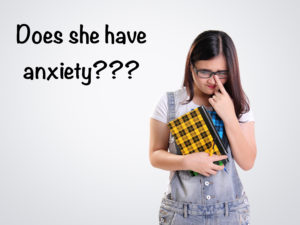Anxiety can be tricky to identify because it can manifest in many different ways. People often ask what’s the difference between a little worrying and anxiety? Therefore, I’ve put together a list of common signs of anxiety to give you a general idea of what anxiety can look and feel like.
What Are the Signs of Anxiety in My Child?
Everything is on a continuum but if you feel that your child or teen is exhibiting these signs of anxiety on a regular basis, it doesn’t seem to be typical for their age and stage of development and it’s impacting their happiness and daily functioning, then I recommend seeking further professional advice.
*This is by no means an exhaustive list nor a diagnostic list for an anxiety disorder. This list is for informational purposes only and if you notice that your child or teen is experiencing some of these signs of anxiety, it’s recommended that you discuss this with your family doctor and/or a licensed mental health practitioner.
Some Common Signs of Anxiety*
- Over thinking things and catastrophizing
- Perfectionism – worries about their performance and how others will view them
- Rigidity – demands that things be executed in a certain way
- All or nothing thinking – either everything is a success or it’s a failure – there’s no area in between
- Focussing on the negative/jumping to negative conclusions
- Minimizing the positive
- Physical signs that have no physical medical explanation such as recurring stomachaches, headaches, tight chest, nausea, rapid heart rate, muscle aches/soreness, shortness of breath
- Going into the future and thinking of the worst case scenario
- Fight (irritability, arguing, yelling) especially when you ask your child to do something that’s causing angst
- Flight – runs away from or completely avoids situations and/or social activities
- Freeze – takes a really long time to warm up or sometimes never warms up to a situation
- Highly sensitive profile leads to a higher propensity for anxiety concerns (Highly Sensitive Profile = Big feeler, Agitated by loud noises, certain textures etc. especially when they were younger, Hypervigilant, Process deeply, Deep empathy)
- Irrational fears/phobias
- Sleep problems – difficulty going to sleep and/or waking up in the night/nightmares
- Difficulty concentrating, restlessness, mind goes blank
- Nervousness on a regular basis
- Excessive worrying on a daily basis – lots of asking for reassurance and “What if?” questions
- Consistent fear of being judged, humiliated or embarrassed by others – very self conscious
- Distressed to leave parents during the day or overnight – for example: going to school, a sleepover or outdoor school
- Strong sense of moral justice and expectation that others should act in a certain way
- Blames others/tries to control others when highly stressed
- Repetitive actions – counting, clicking, hand washing, checking, hoarding, creating symmetrical
Cognitive Behavioural Therapy for Anxiety
Cognitive Behavioural Therapy (CBT) is often referred to as the “gold standard” for treating anxiety. In this research article, Cognitive Behavioural therapy for Anxiety Disorders in Youth, it is stated that “CBT is the only psychological treatment identified to date as an evidence-based treatment.”
In the same journal article, the key components of a good CBT program are states as:
“A comprehensive assessment, development of a good therapeutic relationship and working alliance, cognitive restructuring, repeated exposure with reduction of avoidance behaviour, and skills training comprise the core procedures for the treatment of anxiety disorders in youth.”
Cognitive restructuring refers to helping the child identify his/her irrational thoughts and replacing these thoughts with ones that are more helpful and based in actuality.
Repeated exposure with reduction of avoidance behaviour is the step-by-step process of facing ones fears which I have previously summarized in this blog post, How Much to Push My Anxious Child.
In my 27+ years of counselling children and youth, I have found that I have had the most success with CBT which is why it is the foundation of my children’s groups and 1:1 counselling. This is also the reason why I wrote my children’s book, so that these valuable CBT skills could be learned by children starting from age 5 years old.
Hopefully you now have more clarity and knowledge for recognizing the signs of anxiety or spotting when it’s just starting.
Being anxious is an instinctual response so it’s important to remain compassionate and remember the wise words of Dr. Ross Greene, author of The Explosive Child:
“Children do well if they can, not children do well if they want to.”
Children want to do well. It doesn’t feel good when you’re not doing well but sometimes, there’s something that’s blocking the way, and as adults we need to help figure out what that is. (See my blog post on this topic here.)
If you’re interested in having your child develop a foundation of CBT skills, my next “Brain Science” groups to teach children about anxiety and how to manage it using CBT, start:
Tuesday, May 20th, 2025 (in-person) and Wednesday, May 21st, 2025 (online).
These groups are for children ages 7-9 yrs. and 10-12 yrs. The groups run for seven sessions after school. The children meet with me for the first 45 minutes (we do fun activities related to the concept we’re learning) and the parents meet with me on Zoom for the last 15 minutes to learn the same strategies. Click here to learn more and register online.
Warmly,

PS. To receive my free ebook: 8 Common Mistakes to Avoid When Your Child Is Anxious click here.
PPS. To learn more about my children’s book (and parents’ and educators’ resource) Surfing the Worry Imp’s Wave click here.
Want to Connect?
Subscribe now to receive free weekly parenting tips and inspiration.







